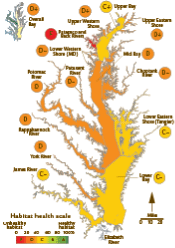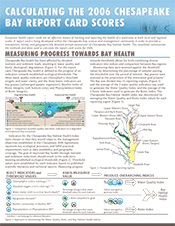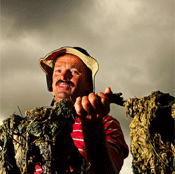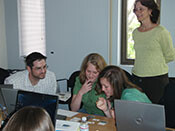2006 Chesapeake Bay Report Card
 IAN and EcoCheck (a NOAA-UMCES partnership) recently released the 2006 Chesapeake Bay Report Card. The report card provides a scientifically robust — and geographically detailed — annual assessment of Chesapeake Bay habitat health. This report card rates 15 reporting regions of the Bay using six indicators that are combined into a single overarching index of habitat health. Habitat health is defined as progress of the six indicators towards established scientifically derived ecological thresholds or goals. The report card was produced in partnership with many Chesapeake Bay scientific and management organizations and individuals. The report card and supporting material can be downloaded from the EcoCheck website.
IAN and EcoCheck (a NOAA-UMCES partnership) recently released the 2006 Chesapeake Bay Report Card. The report card provides a scientifically robust — and geographically detailed — annual assessment of Chesapeake Bay habitat health. This report card rates 15 reporting regions of the Bay using six indicators that are combined into a single overarching index of habitat health. Habitat health is defined as progress of the six indicators towards established scientifically derived ecological thresholds or goals. The report card was produced in partnership with many Chesapeake Bay scientific and management organizations and individuals. The report card and supporting material can be downloaded from the EcoCheck website.
Calculating the 2006 Chesapeake Bay report card scores
 This newsletter describes the methods and approach underpinning the 2006 Chesapeake Bay Report Card. Specific topics covered include selection of indicators, the methods used to combine indicators into overarching indices and selection of reporting regions. The newsletter also summarizes how the sensitivity of the Water Quality Index was tested by comparing results from high and low nutrient load years. The newsletter can be downloaded from the EcoCheck website.
This newsletter describes the methods and approach underpinning the 2006 Chesapeake Bay Report Card. Specific topics covered include selection of indicators, the methods used to combine indicators into overarching indices and selection of reporting regions. The newsletter also summarizes how the sensitivity of the Water Quality Index was tested by comparing results from high and low nutrient load years. The newsletter can be downloaded from the EcoCheck website.
Altered Oceans series wins Pulitzer Prize
 The Los Angeles Times series on "Altered Oceans: A five part series on the crisis in the seas" was awarded the Pulitzer Prize for Explanatory Reporting. Drs. Judy O'Neil, Pat Glibert and Bill Dennison from the University of Maryland Center for Environmental Science were featured in the series written by Ken Weiss and colleagues. The entire series, with videos, photos, graphics and PDFs, is available as a DVD as well as on the LA Times web site. The series covers a variety of issues, including habitat degradation, toxic algae, red tides, plastic debris, and ocean acidification with examples from around the world.
The Los Angeles Times series on "Altered Oceans: A five part series on the crisis in the seas" was awarded the Pulitzer Prize for Explanatory Reporting. Drs. Judy O'Neil, Pat Glibert and Bill Dennison from the University of Maryland Center for Environmental Science were featured in the series written by Ken Weiss and colleagues. The entire series, with videos, photos, graphics and PDFs, is available as a DVD as well as on the LA Times web site. The series covers a variety of issues, including habitat degradation, toxic algae, red tides, plastic debris, and ocean acidification with examples from around the world.
Science Communication Course
 April 23–27, 2007, the IAN group held their course in Communicating Science Effectively at the IAN Annapolis Synthesis Center in Annapolis, MD. For the first time, this course included a module on media training. The participants included staff from the Chesapeake Research Consortium (MD), Worcester County (MD), Environmental Protection Agency (LA), the Tampa Bay Estuary Program (FL) and the Environmental Protection Commission of Hillsborough (MD). Participants left the course with a wide range of new skills and a series of communication products including a conceptual diagram, and a newsletter, poster or website.
April 23–27, 2007, the IAN group held their course in Communicating Science Effectively at the IAN Annapolis Synthesis Center in Annapolis, MD. For the first time, this course included a module on media training. The participants included staff from the Chesapeake Research Consortium (MD), Worcester County (MD), Environmental Protection Agency (LA), the Tampa Bay Estuary Program (FL) and the Environmental Protection Commission of Hillsborough (MD). Participants left the course with a wide range of new skills and a series of communication products including a conceptual diagram, and a newsletter, poster or website.